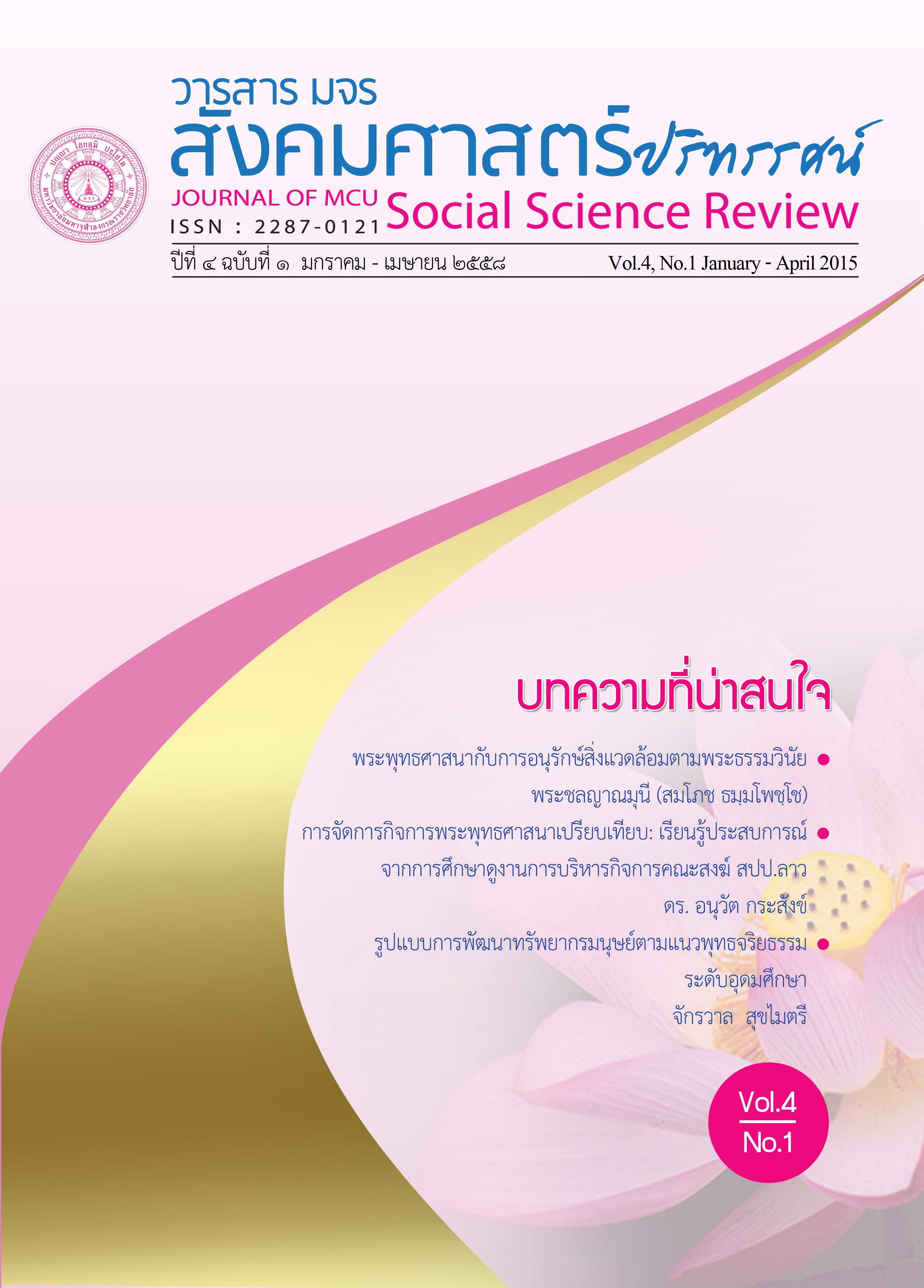คุณลักษณะของบัณฑิตที่มีผลต่อการจ้างงานของบัณฑิต หลักสูตรพุทธศาสตรมหาบัณฑิต สาขาวิชาการจัดการเชิงพุทธและ สาขาวิชารัฐประศาสนศาสตร์ คณะสังคมศาสตร์ มหาวิทยาลัยมหาจุฬาลงกรณราชวิทยาลัย
คำสำคัญ:
คุณลักษณะ, การจ้างงานบทคัดย่อ
การวิจัยครั้งนี้มีวัตถุประสงค์ คือ ๑) เพื่อศึกษาระดับความพึงพอใจของผู้ใช้บัณฑิตที่มีผล ต่อการจ้างงานของบัณฑิตหลักสูตรพุทธศาสตรมหาบัณฑิต สาขาวิชาการจัดการเชิงพุทธ และ สาขาวิชารัฐประศาสนศาสตร์ คณะสังคมศาสตร์ มหาวิทยาลัยมหาจุฬาลงกรณราชวิทยาลัย ๒) เพื่อ ศึกษาระดับความพึงพอใจที่นายจ้างหรือผู้ประกอบการมีต่อบัณฑิตที่ทํางานในสถานประกอบการ และ ๓) เพื่อศึกษาความต้องการและจุดที่ควรปรับปรุงคุณภาพของบัณฑิตให้สอดคล้องกับ คุณลักษณะของผู้ปฏิบัติงานที่ดีเข้าทํางานในสถานประกอบการตามที่ผู้ประกอบการต้องการ โดย ดําเนินการวิจัยตามวิธีวิจัยเชิงสํารวจ (Survey Research) โดยใช้แบบสอบถาม เก็บรวบรวมข้อมูล จากกลุ่มประชากรตัวอย่าง จํานวน ๑๕๕ คน ซึ่งใช้การสุ่มตัวอย่างใช้การสุ่มอย่างง่ายโดยกําหนด สัดส่วน วิเคราะห์ข้อมูล โดยการหา ค่าความถี่ ค่าร้อยละ ค่าเฉลี่ย ส่วนเบี่ยงเบนมาตรฐาน (standard deviation)
ผลการวิจัยพบว่า
๑. ระดับความพึงพอใจของผู้ใช้บัณฑิตที่มีผลต่อการจ้างงานของบัณฑิตหลักสูตรพุทธ ศาสตรมหาบัณฑิตสาขาวิชาการจัดการเชิงพุทธและสาขาวิชารัฐประศาสนศาสตร์ คณะสังคมศาสตร์ มหาวิทยาลัยมหาจุฬาลงกรณราชวิทยาลัย พบว่า มีค่าเฉลี่ยความพึงพอใจต่อบัณฑิตหลักสูตรพุทธ ศาสตรมหาบัณฑิตสาขาวิชาการจัดการเชิงพุทธและสาขาวิชารัฐประศาสนศาสตร์ คณะสังคมศาสตร์ มหาวิทยาลัยมหาจุฬาลงกรณราชวิทยาลัยในระดับมาก (X = ๓.๘๕, SD = ๐.๖๐) นายจ้างมี ความพึงพอใจต่อบัณฑิตในทุกองค์ประกอบหลักในระดับมาก ด้านคุณธรรม จริยธรรมและ มนุษย สัมพันธ์ (X = ๓.๘๕, SD = ๐.๖๐) ด้านความรับผิดชอบต่อจรรยาบรรณวิชาชีพ (X = ๓.๔๖, SD = 0.๖๔) และด้านความรู้ทางวิชาการ/วิชาชีพ (X = ๓.๖๕, SD = 0.๕๕)
๒. ระดับความพึงพอใจของนายจ้างหรือผู้ประกอบการหรือผู้ใช้บัณฑิตที่มีต่อบัณฑิต หลักสูตรพุทธศาสตรมหาบัณฑิตสาขาวิชาการจัดการเชิงพุทธและสาขาวิชารัฐประศาสนศาสตร์ คณะสังคมศาสตร์ มหาวิทยาลัยมหาจุฬาลงกรณราชวิทยาลัยในมุมมองจากคุณลักษณะพื้นฐานของ นายจ้างหรือผู้ประกอบการหรือผู้ใช้บัณฑิต พบว่านายจ้างที่เป็นเพศชายมีค่าเฉลี่ยความพึงพอใจต่อ บัณฑิต (X =๓.๙๔, SD = 0.๕๖) สูงกว่าเพศหญิง (X =๓.๗๖, SD = ๐.๖๓) อย่างมีเอกภาพ แต่นายจ้างทั้งสองเพศก็มีความพึงพอใจต่อบัณฑิตหลักสูตรพุทธศาสตรมหาบัณฑิตสาขาวิชาการ จัดการเชิงพุทธและสาขาวิชารัฐประศาสนศาสตร์ คณะสังคมศาสตร์ มหาวิทยาลัยมหาจุฬาลงกรณ ราชวิทยาลัย อยู่ในระดับมาก การตรวจสอบค่าเฉลี่ยความพึงพอใจระหว่างกลุ่มเมื่อแจกแจง นายจ้างออกตามช่วงอายุตัว ระดับตําแหน่งหน้าที่ผู้บังคับบัญชา ระดับการศึกษา ระยะเวลาช่วง ประสบการณ์ทํางาน ขนาดของสถานประกอบการ รวมถึงวิธีการคัดเลือกบุคคลเข้าสู่ตําแหน่งงาน ในสถานประกอบการ พบว่า ในแต่ละกลุ่มตัวอย่างย่อยๆ นั้น มีค่าเฉลี่ยความความพึงพอใจต่อ บัณฑิตแตกต่างกันจริง แต่ไม่มีนัยสําคัญทางสถิติ สิ่งที่น่าสังเกตที่ได้จากการวิเคราะห์ข้อมูล คือ ความเห็นของกลุ่มนายจ้างที่แจกแจงตามประเภทของสถานประกอบการเท่านั้น ที่พบว่ามีความ แตกต่างกันระหว่างกลุ่มย่อยอย่างมีนัยสําคัญทางสถิติ (F=๒.๓๔ ระดับนัยสําคัญ ๐.๐๔) การ ตรวจสอบรายละเอียดพบว่าสถานประกอบการภาครัฐบาลมีความพึงพอใจต่อบัณฑิตของหลักสูตร พุทธศาสตรมหาบัณฑิตสาขาวิชาการจัดการเชิงพุทธและสาขาวิชารัฐประศาสนศาสตร์ คณะสังคมศาสตร์ มหาวิทยาลัยมหาจุฬาลงกรณราชวิทยาลัย (X =๔.๐๒, SD = ๐.๕๓) สูงกว่า สถานประกอบการภาคเอกชน (X =๓.๖๖, SD = 0.๖๔) ผู้วิจัยมีความเห็นว่า สถาน ประกอบการของทางราชการที่รับบัณฑิตเข้าทํางาน ส่วนใหญ่เป็นสถานศึกษาที่กําลังต้องการผู้ ปฏิบัติหน้าที่ครูผู้สอนในรายวิชาต่างๆ ซึ่งปรากฏผลการสํารวจของกองแผนงาน คณะสังคมศาสตร์ มหาวิทยาลัยมหาจุฬาลงกรณราชวิทยาลัย พบว่าบัณฑิตส่วนใหญ่ประกอบอาชีพในสถานศึกษา ส่วนระดับความพึงพอใจของนายจ้างภาคเอกชน ซึ่งปรากฏกระจายไปหลายกลุ่มนอกเหนือจาก สถานศึกษาของเอกชน ระดับความพึงพอใจของนายจ้างภาคเอกชนแม้จะสามารถจัดระดับได้ใน กลุ่มความพึงพอใจมาก แต่ก็มีค่าไม่ห่างจากค่าระดับปานกลางเท่าใดนัก
๓. ความต้องการและจุดที่ควรปรับปรุงคุณภาพของบัณฑิตให้สอดคล้องกับคุณลักษณะ ของผู้ปฏิบัติงานที่ดีเข้าทํางานในสถานประกอบการตามที่ผู้ประกอบการต้องการ พบว่า หลักสูตร พุทธศาสตรมหาบัณฑิต สาขาวิชาการจัดการเชิงพุทธและสาขาวิชารัฐประศาสนศาสตร์ คณะสังคมศาสตร์ มหาวิทยาลัยมหาจุฬาลงกรณราชวิทยาลัย ดําเนินการสอนระดับอุดมศึกษามา เป็นเวลานาน มีประสบการสั่งสมในการอบรมสั่งสอนเยาวชน สามารถผลิตบัณฑิตที่มีคุณภาพดีป้อน สู่สังคม แต่อย่างไรก็ตาม สภาวการณ์ต่าง ๆ ทางเศรษฐกิจ สังคม ซึ่งมีความเปลี่ยนแปลงอย่าง มากมายเมื่อเปรียบเทียบกับช่วงก่อนๆ คุณภาพของบัณฑิตไม่ได้ก่อเกิดขึ้นจากการผ่านเข้าไปศึกษา ในสถานศึกษาจนครบหลักสูตรแล้วก็จะได้ตัวบัณฑิตที่มีคุณภาพตามที่สังคมต้องการ สถานศึกษา โปรแกรมการศึกษา ตลอดจนการจัดปัจจัยเกื้อหนุนการพัฒนานิสิตด้านต่างๆ ที่ถูกจัดสรรไว้จะไม่ บังเกิดผลเลย หากนิสิตแต่ละคนไม่ฝักใฝ่ฝึกฝนตนเองให้บรรลุเป้าหมายของการฝึกอบรมบ่มเพาะ พื้นฐานดั้งเดิมของแต่ละบุคคลก็เป็นปัจจัยหลักที่ติดตัวเขาไปตลอด เมื่อบัณฑิตสําเร็จการศึกษา เดินออกจากสถานศึกษาเข้าสู่สถานประกอบการจึงเป็นไปได้ว่าจะพบเห็นบุคลิกภาพต่างๆ ทั้งที่ สร้างความประทับใจและความขัดแย้งในระดับต่างๆ แก่นายจ้างผู้ประกอบการ
เอกสารอ้างอิง
(๑) หนังสือ
ปรียาพร วงศ์อนุตรโรจน์, จิตวิทยาการบริหารบุคคล กรุงเทพมหานคร: สหมิตรออฟเซต, ๒๕๓๕ ชูศักดิ์ เจนประโคน, การประเมินค่างานและการประเมินพนักงาน. กรุงเทพมหานคร: สํานักพิมพ์มหาวิทยาลัยรามคําแหง, ๒๕๔๔.
(๒) วิทยานิพนธ์/รายงานการวิจัย
สมหมาย บัวจันทร์, “การวิเคราะห์และยกระดับความพึงพอใจในการให้บริการประชาชนตามหลักสังคหวัตถุ ๔ ของสํานักงานเขตบางแค กรุงเทพมหานคร”, วิทยานิพนธ์พุทธศาสตร มหาบัณฑิต, (สาขาวิชารัฐประศาสนศาสตร์), มหาวิทยาลัยมหาจุฬาลงกรณราชวิทยาลัย, ๒๕๕๑.
ศุภศิลป์ ไทยปรีชา, “ความพึงพอใจของผู้ใช้บริการธนาคารไทยพาณิชย์ จํากัด (มหาชน) สาขานครปฐม”, ภาคนิพนธ์บริหารธุรกิจมหาบัณฑิต, (สาขาการจัดการทั่วไป), มหาวิทยาลัยราชภัฏสวนดุสิต, ๒๕๔๘.
๒. ภาษาอังกฤษ
(๑) Books Benjamin B. Wolman. Motivation and Personality. New York : McGraw-Hill. 1976. F. Herzberg. Work and the Nature of Man. New York : The World Publishing Co., 1966.
ดาวน์โหลด
เผยแพร่แล้ว
รูปแบบการอ้างอิง
ฉบับ
ประเภทบทความ
สัญญาอนุญาต
ลิขสิทธิ์ (c) 2018 วารสาร มจร สังคมศาสตร์ปริทรรศน์

อนุญาตภายใต้เงื่อนไข Creative Commons Attribution-NonCommercial-NoDerivatives 4.0 International License.
เพื่อให้เป็นไปตามกฎหมายลิขสิทธิ์ ผู้นิพนธ์ทุกท่านต้องลงลายมือชื่อในแบบฟอร์มใบมอบลิขสิทธิ์บทความให้แก่วารสารฯ พร้อมกับบทความต้นฉบับที่ได้แก้ไขครั้งสุดท้าย นอกจากนี้ ผู้นิพนธ์ทุกท่านต้องยืนยันว่าบทความต้นฉบับที่ส่งมาตีพิมพ์นั้น ได้ส่งมาตีพิมพ์เฉพาะในวารสาร มจร สังคมศาสตร์ปริทรรศน์ เพียงแห่งเดียวเท่านั้น หากมีการใช้ภาพหรือตารางหรือเนื้อหาอื่นๆ ของผู้นิพนธ์อื่นที่ปรากฏในสิ่งตีพิมพ์อื่นมาแล้ว ผู้นิพนธ์ต้องขออนุญาตเจ้าของลิขสิทธิ์ก่อน พร้อมทั้งแสดงหนังสือที่ได้รับการยินยอมต่อบรรณาธิการ ก่อนที่บทความจะได้รับการตีพิมพ์ หากไม่เป็นไปตามข้อกำหนดเบื้องต้น ทางวารสารจะถอดบทความของท่านออกโดยไม่มีข้อยกเว้นใดๆ ทั้งสิ้น





